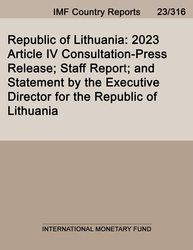
Republic of Lithuania: 2023 Article IV Consultation-Press Release; Staff Report; and Statement by the Executive Director for the Republic of Lithuania
Republic of Lithuania: 2023 Article IV Consultation-Press Release; Staff Report; and Statement by the Executive Director for the Republic of Lithuania
READ MORE...
Volume/Issue:
Volume 2023
Issue 316
Publication date: September 2023
ISBN: 9798400254048
$20.00
Add to Cart by clicking price of the language and format you'd like to purchase
Available Languages and Formats
| English |
Prices in red indicate formats that are not yet available but are forthcoming.
Topics covered in this book
This title contains information about the following subjects.
Click on a subject if you would like to see other titles with the same subjects.
Inflation , Labor , Economics- Macroeconomics , Money and Monetary Policy , Business and Economics - Statistics , International - Economics , inflation risk , safeguards assessment policy , price competitiveness , energy price shock , price pressure , inflation dynamics , weakening economy , BoL website , Inflation , Loans , Labor markets , Fiscal stance , Real estate prices , Baltics , Global , Western Europe
Also of interest
Summary
The 2023 Article IV Consultation discusses that Lithuania weathered a series of unprecedented external shocks, owing to resilient macroeconomic fundamentals and a decisive policy response. The strong post-pandemic recovery led to demand driven inflationary pressures. Supply side bottlenecks and large increases in commodity prices after Russia’s invasion of Ukraine compounded these pressures and resulted in high and persistent inflation. With monetary conditions that are too loose for Lithuania, the onus to fight inflation and maintain competitiveness is on fiscal policy and structural reforms. Short-term policies should aim at reducing inflationary pressures and preserving financial stability. Long-term policies should focus on implementing long-overdue structural reforms that remain key to raising further the economy’s growth potential supporting faster income convergence with Western Europe. Fiscal policy needs to take a disinflationary stance. This will require a lower-than budgeted deficit this year, notwithstanding a weakening economy and a contractionary stance going forward in line with the domestic fiscal rule. The report recommends implementing long-overdue structural reforms to strengthen education and healthcare and to address risks associated with climate change. Utilize EU funds efficiently to enhance private sector productivity.
Copyright © 2010 - 2026
Powered by:
AIDC



